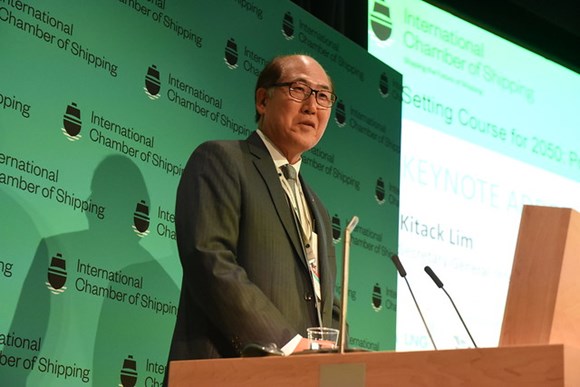
13 September 2019, 16:44
Driving a ship propulsion revolution

IMO initial GHG strategy is driving a new propulsion revolution
Speaking at London International shipping Week, IMO Secretary-General Kitack Lim said,
"The initial strategy adopted last year is a major policy commitment for a drastic reduction of GHG emissions from ships, with a specific linkage to the Paris Agreement, and clear levels of ambition – including at least a 50 per cent cut in emissions from the sector by 2050, compared to 2008.
"In the short-term, IMO will consider concrete measures in the following areas: improvement of the operational energy efficiency of existing ships, reduction of methane slip, encouragement of National Action Plans and encouragement of the uptake of alternative low-carbon and zero-carbon fuels.
The targets set out in the strategy will not be met using fossil fuels only, which is why this strategy is expected to drive a new propulsion revolution. This zero-carbon future requires a great deal of research and development. So, as well as the regulatory imperative, there is a need to make zero-carbon ships more attractive and to direct investments towards innovative sustainable technologies and alternative low-carbon and zero-carbon fuels.
There are already strong signs emerging that some sectors of the industry are really grasping this. Battery powered and hybrid ferries, ships trialling biofuels or hydrogen fuel cells, wind-assisted propulsion and several other ideas are now being actively explored. The IMO GHG strategy has sent a clear signal to innovators that this is the way forward. However, actions need to be accelerated if its goals are to be achieved.
The decade 2020-2030 needs to be a decade of action and delivery on these goals."
Sulphur 2020
Commenting on the IMO sulphur 2020 regulation, IMO Secretary-General Kitack Lim said,
"The 2020 entry into force of the new global sulphur limit of 0.5 per cent for ships' fuel oil was first adopted in 2008 and confirmed again in 2016. It has been a long time coming and is now fast approaching.
IMO has worked hard, with Member States and the shipping and bunker supply industries, to support the implementation of this important, global, rule. Detailed and comprehensive implementation guidelines have been developed, for the shipping industry, for fuel oil suppliers and for Member States.
Ultimately, compliance rests with the industry, while monitoring and enforcement are the responsibility of the IMO Member States. I get a clear sense that the Member States and the industry are taking this responsibility very seriously indeed.
I am confident that the implementation date on 1 January 2020 will be managed smoothly."
Contact Information
Natasha Brown
Head, Public Information Services
IMO
+44 (0)20 7587 3274
+44 (0)7814702093
Nbrown@imo.org
Notes to editors
Photos: via LISW 19 flikr: https://www.flickr.com/photos/lisw15/albums/72157710704316098
Read IMO Secretary-General Kitack Lim's LISW speeches:
London International Shipping Week Headline Conference 12/09/2019
London International Shipping Week: ICS - Setting the course for 2050: Powering the global trade11/09/2019
WISTA/Inmarsat panel during London International Shipping Week on "Digitalization and Diversity"10/09/2019
London Stock Exchange Market Open Ceremony 09/09/2019
Read more on the initial IMO GHG strategy: http://www.imo.org/en/MediaCentre/HotTopics/Pages/Reducing-greenhouse-gas-emissions-from-ships.aspx
Read more on sulphur 2020: http://www.imo.org/en/MediaCentre/HotTopics/Pages/Sulphur-2020.aspx
Register for the Symposium on IMO 2020 and Alternative Fuels on Thursday, 17 October and Friday, 18 October 2019: http://www.imo.org/en/About/Events/Pages/Symposium-on-IMO-2020-and-Alternative-Fuels--.aspx

